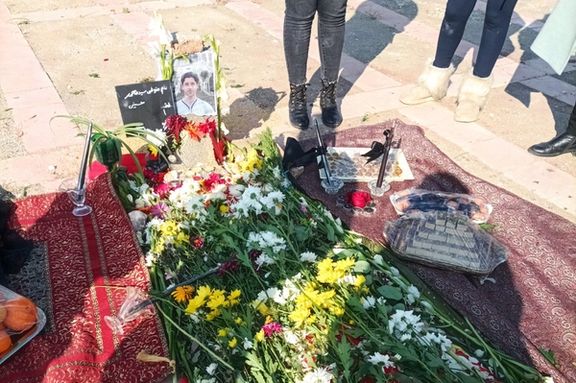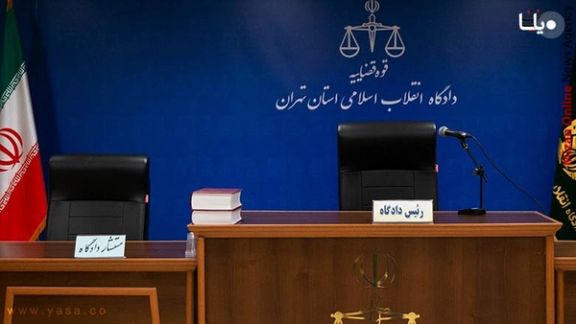Grief Of Executions Consolidating Iranians’ Resolve Against Regime

Grieving over the execution of Iranian protester Mohammad Hosseini, several young women gathered at his grave to mourn his untimely death that has cast a somber gloom on the country.

Grieving over the execution of Iranian protester Mohammad Hosseini, several young women gathered at his grave to mourn his untimely death that has cast a somber gloom on the country.
In a video sent to Iran International on Sunday, a woman is heard addressing Mohammad, who was hanged on January 7, telling him that he has numerous sisters now, while another woman is heard weeping in the background.
"Dear Mohammed, my good brother, now you have so many sisters here, you are not alone anymore, we came from a far distance in this cold because you sacrificed your life for us, we all love you, you are in our hearts," the woman said.
The 39-year-old – with no apparent family members -- was one of the loneliest victims of the regime’s crackdown, and his hanging drew massive reactions on social media, where Iranian can speak freely. Soon after his death, he became an icon of solitude in the face of the Islamic Republic’s oppression. His grave is regularly showered with flowers and people distribute food and sweets in the honor of their new hero, as is customary by bereaved families in Iran. There are numerous social media posts by people who visit his grave to show that he is not alone, saying all Iranians are his family.

The regime hanged Hosseini along with Mohammad Mahdi Karami for allegedly killing a member of the security forces during nationwide protests that were triggered following the death of 22-year-old Kurdish woman Mahsa Amini in police custody in September. The convictions were not based on a criminal charge related to the murder per se, but they were charged with ‘moharebeh’, meaning “war against God”, a vague religious concept. The Islamic Republic applies the charge to people who might get into a confrontation with security forces during protests.
The executions led to condemnation by many countries and summoning of Islamic Republic envoys in several capitals, as well as a global outcry by politicians and human rights activists. Moreover, lawyers of the two young protesters say the judiciary executed them so hastily that there was no chance for legal follow-up on their cases.
So far, the government has executed four protesters and eleven others have received the death penalty, some for less serious charges than murder, while at least 109 protesters face charges that could end in death sentences for them, an Iranian human rights group based in Oslo has reported. The Iran Human Rights Organization said in its latest report that this figure is a minimum estimate as most families are under pressure to stay quiet, and the real number is believed to be much higher. According to the US-based Human Rights Activists News Agency (HRANA), nearly 20,000 people have been arrested during the antigovernment rallies.
While protests continue usually during the mourning ceremonies for the third, seventh and the 40th day after the death of protesters, the Islamic Republic is issuing death sentences, long prison terms and floggings to quell the revolt.
Earlier in the week, the judiciary announced that a court has sentenced three others to death for “war against God” in a case known in media as the "Khane-ye Esfahan." Three more were also sentenced to death in another case over antigovernment protests in the northern city of Nowshahr. One of them, Javad Rouhi, received three death sentences on charges of "corruption on earth" and "moharebeh" and "Apostasy through desecration of the Quran and other Islamic sanctities as well as burning the Quran.”
This week, branches of the revolutionary courts in different cities continued to issue heavy sentences against people detained during the protests. For example, Mehdi Sabzehparvar was given a five-year sentence, Nazli Saeedi was sentenced to two years ban from leaving the country as well as 15 months of prison, dentistry student Behzad Ghadiri was sentenced to 50 lashes in addition to more than three years of prison, and Amin Amanat was sentenced to four years on charges of "acting against national security" and "propaganda against the regime."